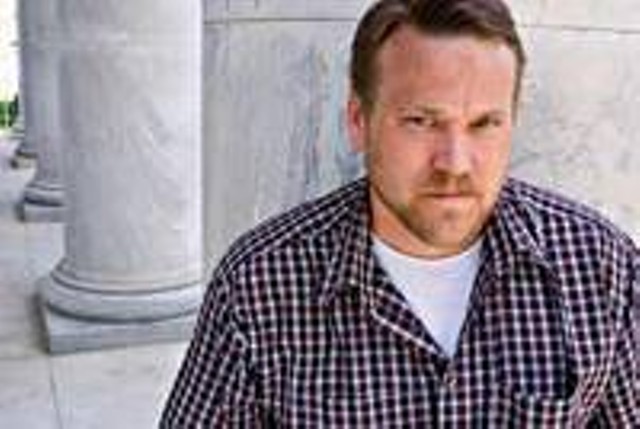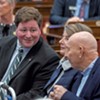Published July 18, 2007 at 3:36 p.m.
Since the late 1980s, Sergeant Joseph Phillips has been employing his primary “combat skill” at a host of strategic sites: Heidelberg, Germany; Moscow, Russia; Middlebury, Vermont.
Come again?
That’s right. Phillips, 42, is a veteran military linguist. This summer, he’s one of more than 1300 students who’ve descended upon Middlebury College to attend one of nine internationally renowned language-immersion summer schools. About 60 percent of his classmates are undergraduates. But rumor has it that Vermont’s infamously pricey ivory tower is crawling with other military folk, too, as well as officials from the Federal Bureau of Investigation and the Central Intelligence Agency.
Any Middlebury student who has stuck around for a summer probably knows a tall tale or two about the federal and military folks at the summer language schools: Maybe they have secret handshakes! Bug-proof dormitories! Blame the flights of fancy on those dreary, scandal-free winters, or on Homeland Security fear mongering. The truth is more elusive. Language-school officials do confirm the presence of military, FBI and CIA personnel, but they don’t provide official stats on these “government students.” Furthermore, State Department agents aren’t allowed to speak with reporters.
But last Wednesday, I managed to catch up with Phillips, a garrulous, Detroit-born linguistic guru who’s done major diplomatic work in Russia and Eastern Europe. I wanted to get the inside scoop on all those mysterious Grown Men with Buzz Cuts.
*****************
We rendezvous at a dark, windowless location: the college juice bar. The linguist has received permission from Middlebury administrators to break their summer-long “No English Spoken Here” dictum. Phillips explains that he’s taking a breather before digging into his nightly assignment — readings in classic and contemporary Russian literature, and a paper on terrorism. Not surprisingly, he has plenty to say about military policy. But the guy exudes more intellectual rigor than bombs-away ’tude. His comments also indicate that any rumors about clandestine activity at Middlebury are about as reliable as one of Colin Powell’s intelligence briefings.
At first glance, Phillips — who also speaks Polish and Serbo-Croatian — looks more Midwestern tourist than senior non-commissioned officer. He has a stocky frame, a close-cropped, reddish beard and a carefully combed ’do. His khaki shorts are frayed, and his feet peek from a pair of leather sandals. “I don’t like to be in the ‘secret world,’” he insists right off the bat. “I’m a linguist geek — I love it. It’s my thing.”
Considering his track record, however, Phillips could easily pass for a wise bureaucrat in some glitzy, early ’90s Hollywood drama about nuclear conflict. This linguist, who describes himself as “the surprisingly intellectual military guy,” works at the Moscow branch office of the Virginia-based Defense Threat Reduction Agency (DTRA) — a Department of Defense outfit that aims to reduce the dangers posed by WMDs. Over the last four years, Phillips has served as a translator and interpreter for senior Russian and Eastern European diplomats and weapons inspectors working under the auspices of post-Cold War disarmament treaties. This summer, he’s on campus for the second installment of a four-summer Master’s program in Russian.
Looking at that CV, you might think Phillips was out of his element here in crunchy Vermont; compared with most American colleges and universities, Middlebury is a veritable pacifist stronghold. In 2002, a few months before the U.S. invaded Iraq, about 1500 protestors demonstrated outside the college chapel during a speech by former Bush press secretary and Midd alum Ari Fleischer. Three years later, students protested the visit of a military recruiter. But Phillips, who’s often mistaken for a State Department official, is unfazed by stereotypes. In fact, he sees himself as an “ambassador” of tolerance.
That mantra must come in handy for a guy who walks the line between camo fatigue and linguistic fancy-pantsiness. Phillips’ very title illustrates his unique role: A “military linguist” denotes an officer who uses language in his or her job. By contrast, the academic linguist studies language, à la MIT prof Noam Chomsky. “Yes, there are a lot of ignorant, uncultured people in the military,” Phillips admits. “But there are also some of those people in the academic community, too.”
According to Phillips, the liberal’s stereotypical view of an Average Military Dude — mindlessly pro-administration, anti-abortion and gay marriage — is just as wrong-headed as the conservative’s of a college professor: “a freakishly left-wing liberal who smokes pot and has orgies all the time.” Phillips adds that, while he’s not averse to discussing politics, he’d much prefer to spend his time dabbling in some intellectual pursuit. This summer, for instance, he has a role in Don’t Leave Your Lovers, a 20th-century Russian play put on by the Russian school August 10. “It’s a romantic comedy,” notes the sergeant.
So how did Phillips fall in love with Middlebury? Chalk it up to serendipity. Like many of his career moves, his decision to study here was inspired by a chance encounter. Back in 2000 he was working as a recruiter; his job was to scour America’s “ethnic enclaves” for future military linguists. At a conference in the Washington, D.C., area, Phillips asked the dean of the Middlebury Language Schools if he could visit campus to give a presentation.
A year later, he gave the talk — sans protest — to an audience of nearly 40 Russian-school students. It got him thinking. “I was impressed [with Middlebury’s program],” he recalls. “I thought, ‘Darn it, this is where I want to study, and I’m gonna make it happen.’” Phillips says the language schools remind him of the American embassy compound in Moscow, where he works; he likens Middlebury’s academic environment to a “steamy pot” of intellectualism. That explains why, the following year, he pressed Uncle Sam into coughing up about three grand for tuition. “That’s the really incredible thing [about the military],” Phillips reflects. “It gives me access to more knowledge than I could’ve dreamed of as a punk kid growing up in Detroit.”
*****************
Academics aside, what’s the deal with all the federal agents on campus? An FBI spokesman in Albany, New York, was not aware that some of his colleagues were perfecting their conversational abilities in the Green Mountains. He referred me to another FBI spokesman in Washington, D.C. Same story. The second agent said he’d try to find someone in his office who knew anything about Middlebury, but no one called back.
College administrators offer some additional info, most of it anecdotal. Jamie Northrup, director of Institutional Collaboration and Marketing for the language schools, says he’s heard there are more government students in the Arabic and Chinese programs now than in previous years. But he speculates the rumors could have more to do with a post-9/11 consciousness than any real surge in personnel. Arabic school coordinator Bill Mayers estimates there aren’t more than a dozen government students in his program, adding, “Sometimes you don’t know — it’s really hard to tell who’s who.”
Mayers can, however, offer insight into the on-campus social division between government students and civilians — or lack thereof. On taking his post three years ago, he heard stories about government students who’d been reprimanded for banding together in “cliques.” At a talent show, for instance, “one class [had done] a skit . . . and they were mocking the government students [as] a group of people who never intermingled.” But Mayers hasn’t witnessed any of that. On the contrary, government students, he says, play on soccer and volleyball teams. They shake their booties on the dance floor. And some jam with the music club.
If there’s any kind of clique-ish tendency afoot in the G.S. crowd, Mayers suggests, it’s attributable to human nature. Intelligence officials are social creatures like the rest of us, after all. “Sometimes you’ll see people from the government who sit at a table and talk at lunch,” he observes. “But I’ll see a couple of Berkeley students sitting together, too.”
According to Mayers, feds often require administrative flexibility. For example, some can’t put aside their work completely, which makes it tough to obey the English-language embargo. “We try to be aware of their needs and accommodate them as much as we can without going overboard,” notes the coordinator diplomatically.
For his part, Phillips suggests it’s “almost inconceivable that there aren’t some CIA guys running around here.” He speculates that the FBI agents at Middlebury’s Russian school are dealing with organized crime in places such as New York and Los Angeles. Aside from that, the sergeant doesn’t have much to say on the topic. He doesn’t know any State Department officials at Middlebury, and his only military pal on campus is a fellow linguist at DTRA.
“Obviously, you notice the guys with short hair and you wonder,” Phillips explains nonchalantly. He adds that if he happens to sit down to eat in the dining hall with someone he thinks is a fellow government employee, he may strike up a conversation about work. But he’s “never met anyone who behaved in a manner that suggested they had something to hide.”
A greater concern is his homework. As a few twentysomething hipsters file past in search of a caffeine fix, Phillips glances at his watch: It’s already 8:30. For him, as for every other student here, tonight will probably be a late one.
This experienced officer also has his future to think about. Despite his age, he’ll probably retire from the military in 2009 — the same year he completes his Master’s in Russian. And that year, an important international agreement — the Reagan-era Strategic Arms Reduction Treaty (START) — will expire. Depending on which new international agreements come on line after that, Phillips says, the nature of Russo-American détente diplomacy could change.
What’s Phillips’ next step? At this point, he’s considering a job at the State Department, or maybe a professorship. With a graduate degree from Middlebury and a meaty resume that includes significant diplomatic and peacekeeping work, he can probably take his pick. “Here I am at a crossroads,” Phillips reflects. “When I finish my Master’s, I’ll have a reasonably good pension and a second career ahead of me.”
Whatever he does, it will no doubt involve his primary peacekeeping tool: words. “I can’t see a life beyond the military that doesn’t involve languages,” he says with a grin. “I just don’t see giving that up.”
More By This Author
About the Artist

Matthew Thorsen
Bio:
Matthew Thorsen was a photographer for Seven Days 1995-2018. Read all about his life and work here.
Matthew Thorsen was a photographer for Seven Days 1995-2018. Read all about his life and work here.
Speaking of...
-

Middlebury: What to See, Do and Eat During the Eclipse
Mar 6, 2024 -

In Terms of Registering to Vote, Midd Kids Are Top of the Classes
Feb 28, 2024 -

During a Previous Explosion of Mideast Bloodshed, a Journalist and His Family Straddled the Divide
Nov 1, 2023 -

19th-Century Educator Alexander Twilight Broke Racial Barriers, but Only Long After His Death. It’s Complicated.
Sep 20, 2023 -

Ninth Annual Middlebury New Filmmakers Festival Features Themes of Perseverance
Aug 16, 2023 - More »
Comments
Comments are closed.
From 2014-2020, Seven Days allowed readers to comment on all stories posted on our website. While we've appreciated the suggestions and insights, right now Seven Days is prioritizing our core mission — producing high-quality, responsible local journalism — over moderating online debates between readers.
To criticize, correct or praise our reporting, please send us a letter to the editor or send us a tip. We’ll check it out and report the results.
Online comments may return when we have better tech tools for managing them. Thanks for reading.













































